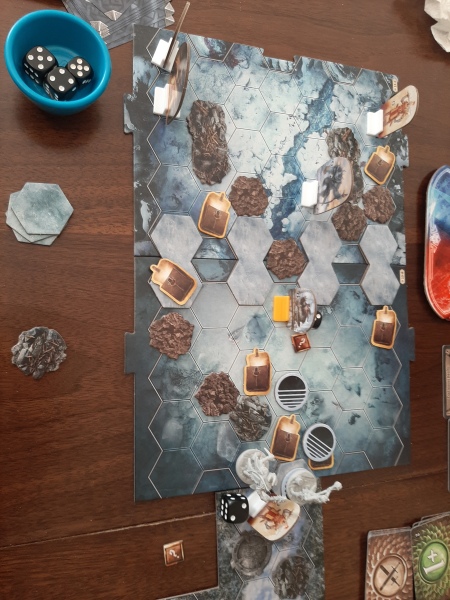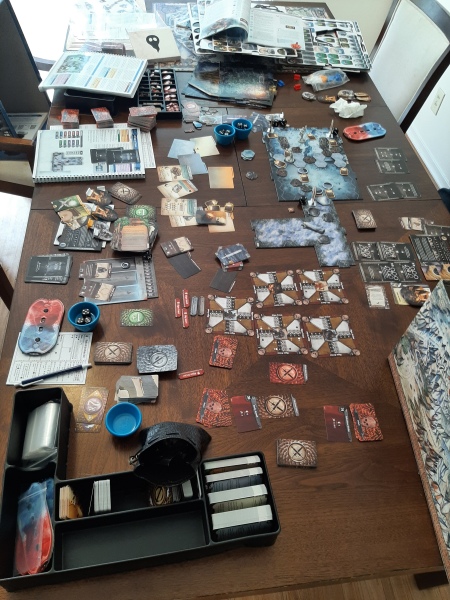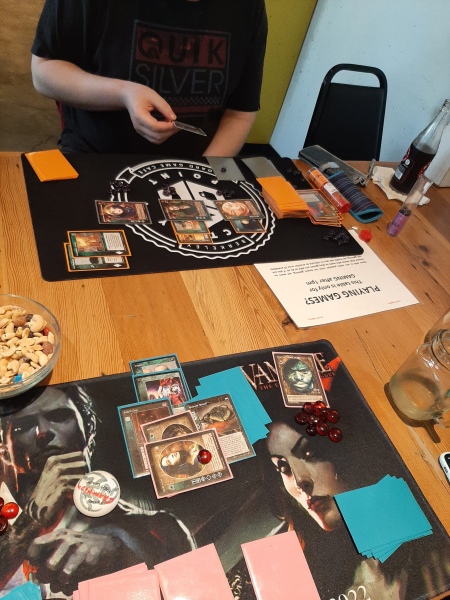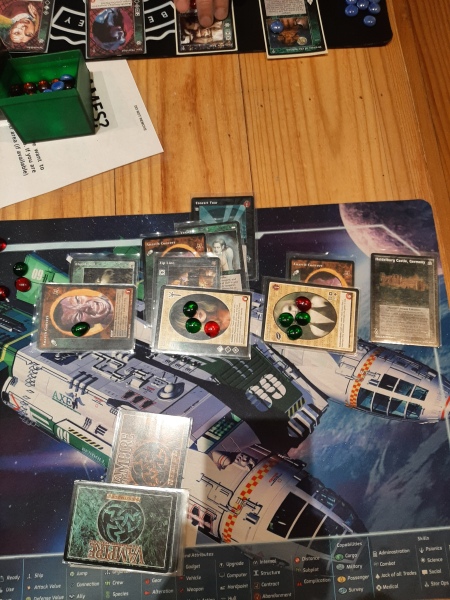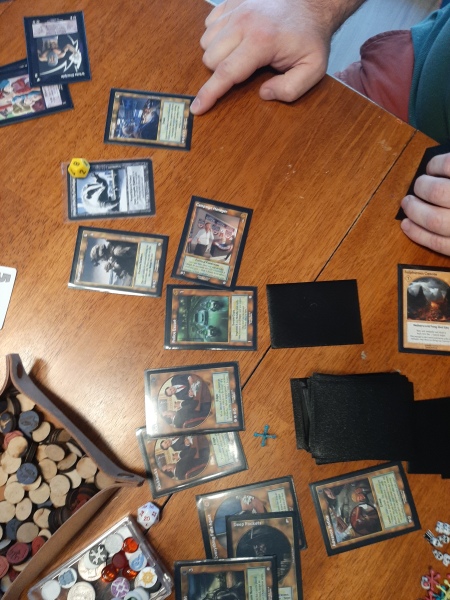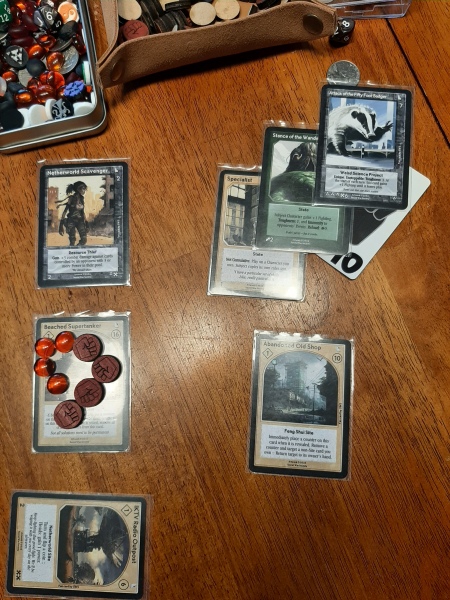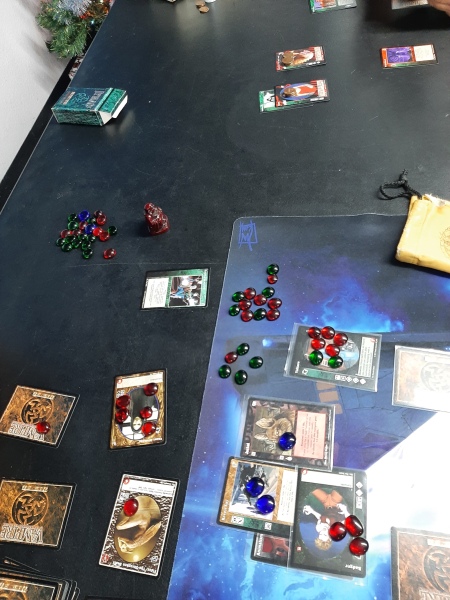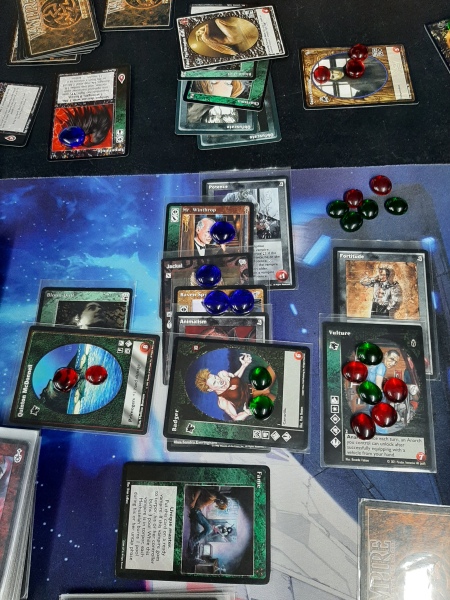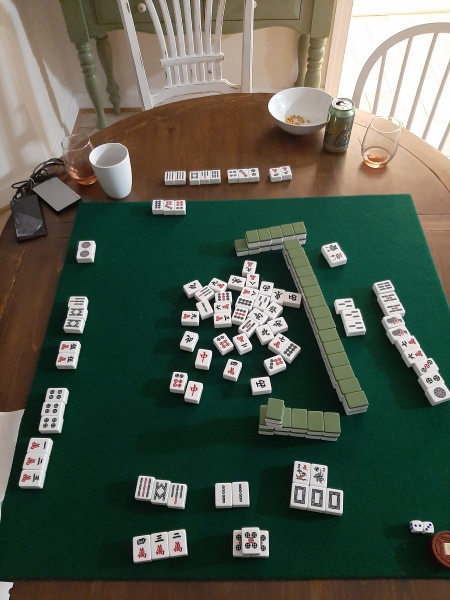Why didn’t I write this a week ago?
I was exhausted at the end of the trip. As is typical when I get back from a vacation, besides needing a vacation, I needed to get caught up on things going on here. I had the time but not the will.
So, I was working up until I took an Uber to the airport Wednesday. Got into New Orleans Airport around 11:30PM. I had chosen to stay at an airport hotel Wednesday and Monday under the theory that I’d use the airport shuttle and it be less “involved” than staying downtown. Sure, I knew that meant Ubering between the hotel and New Orleans proper, but I don’t know what I don’t know.
Like, I didn’t know until close to my trip that the airport shuttle stopped running at 11PM.
I get into room at midnight. I get up at 5AM to head out to downtown New Orleans around 6AM as people are wont to do.
To get my 7:40AM bus to Lafayette. So, I get my first experience of the city – I had never been to Louisiana before – by sitting in the bus/train station for over an hour.
Manage to get to Lafayette and Norm picks me up. We get food, where as a first timer at the chain, they gave me free stuff, which I found curious as to how much they endeavor to find out whether someone has never been to their chain. I make the mistake of getting a burger, but I wanted something easy to eat. I’ve got to stop getting burgers when I travel even if the best meal I’ve ever had in London was getting a burger and fries (yes, fries, this was an American style restaurant). He does some miscellaneous tasks, and I get something of a short nap, then we are off to Vidor, Texas.
Casual play!!
Because we get in early, we go check out the ABnB. It’s a shack, with storage units on the property and nothing else. It was beautiful inside. Modern, straight, I found out the towels were really soft.
We get to Kelly’s store. Time for six games of VTES. Of which, I played in five, as I needed some dinner. Standard thing for me to do in the South and Midwest is to go get some Chinese/Asian food. I asked them if I could change the protein on one of their dishes, and they did that. Also, it was actually spicy. There are Thai places in my hood, you know, the San Francisco Bay Area, where the food isn’t spicy. Not nearly as spicy as the Thai food got on the Big Island, of course, but not like the “Thai” food I’ve gotten in Northwest Arkansas.
First game, I play Blood Brothers w/ Vic deck. I only took seven decks as I knew I’d have to carry all my luggage around with me a significant amount. Logistically, this reminded me in ways of my trip to Stockholm. I had to figure out how to get from Arlanda to where Henrik was, had time to kill until he got off work so walked around Stockholm’s islands with all my stuff, learned how to ride the bus, learned how to take train to get closer to Arlanda then bus when I left. Certainly not precisely the same. But, you learn from doing.
Only two of my decks were new, and one was modified from an existing deck. Something about having work to do but also leaving things to last minute.
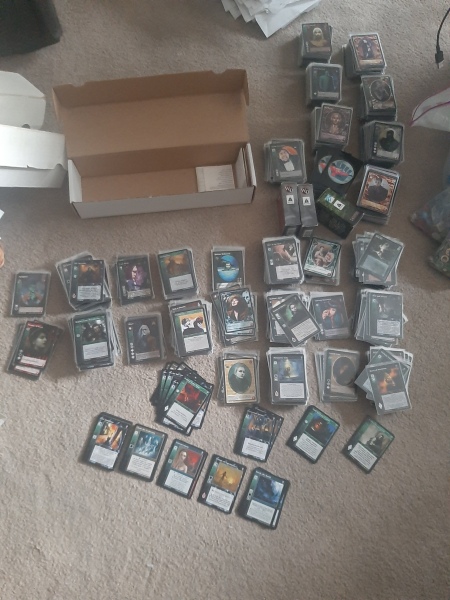
Procrastination for the w- … finals!
I think Clint, my prey, was playing Brujah. I weathered some fighting. Chance, my predator, was playing something that also fought, I think, kind of hard to remember as many details more than a week later after playing something like 17 games and drinking lots of sugar. Then, there was the usual play of Deep Ecology by …
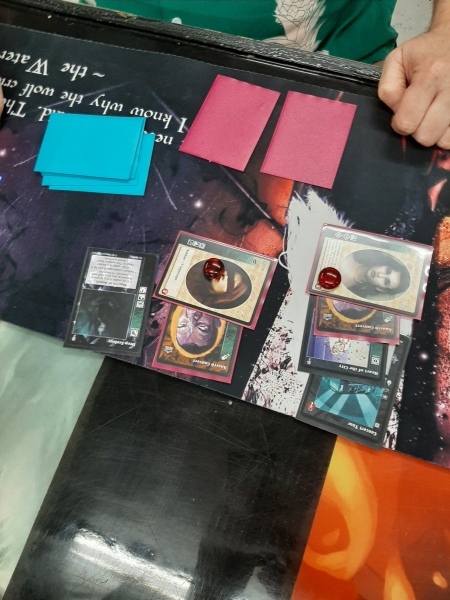
I was an ineffectual predator. For one thing, I couldn’t get the right combat cards in hand at the right time to threaten prey in combat. Not even with this geniusy setup.
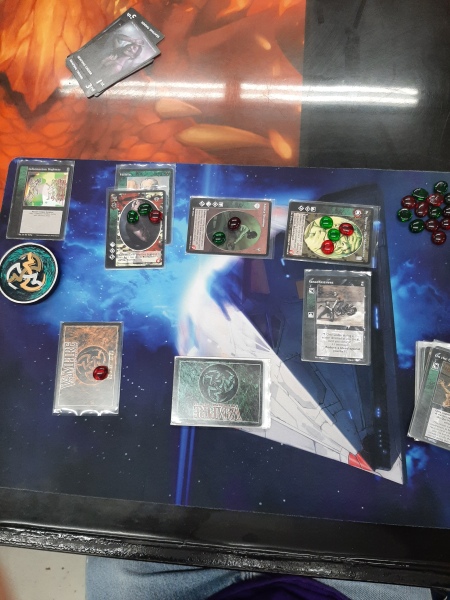
Block those D actions with the power of Fortitude. Hey, quiet, there’s actually a Blood Brother in the picture.
Stuff happened, I got ousted. I was shaking my head when Clint was doing something, and it wasn’t for the reason he thought. I was just shaking my head at the power of new cards.
I think it was game two I sat out for spicy Chinese food, maybe it was game three. Game two/three, played Transfusion. Table was set up well for me, so I got … two VPs.

Yup, set up well. Good ole Dracon as predator. Fortunately, I was there to support my good buddy and rescued … it from torpor and put a blood on him with Transfusion. Then, after he got Animalismed back into torpor again, rescued good ole Dracon again and put a blood on him. Good thing Transfusion has some use to it, right?
After ousting prey, moved around corner of table.
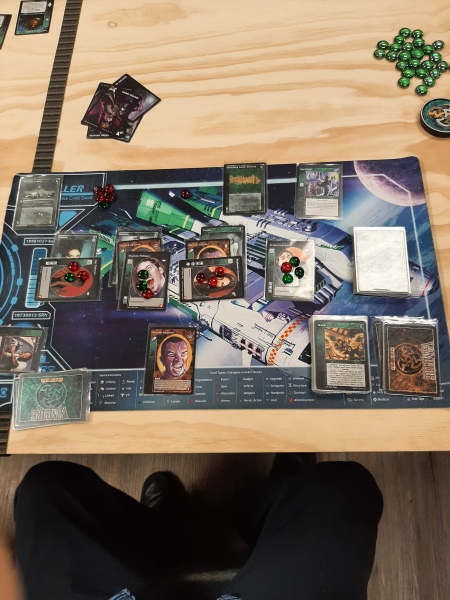
Fame was on my guy in endgame, with Kelly having 1 pool. But, he had Edge, and I couldn’t get through and he could.
I, then, borrowed a deck from Norm. I had his Vampiric Disease deck mostly working. Norm was my prey, of course. Chance my predator with Lord Tremere and others. I would try to get into combat with Lord Tremere, but so did his predator, so Chance’s game kind of sucked. I lost control of my position as I wasn’t really doing things efficiently and Norm gained pool. We talked about changes to the deck. I found the rush combat angle clunky. Something else seemed off to me, but I don’t remember.
Norm made the deck more blocky and played it in later game. I borrowed Chance’s Arika deck in one of these games. Got down to three players, and I kept putting 3 pool damage on my predator, playing Dementation bleed to preserve the three player, ousting Norm with bounce, having double Banishment to buy me enough time to take a game. Ha ha! Victory! With someone else’s deck …
You know, I thought we played six games, with my playing five. But, I also borrowed Kelly’s Trujah deck and played it badly. This was the game of infinite (or at least five) Golcondas, including my Golcondaing myself and my prey’s Cock Robin. I didn’t do well. So, that’s five games of my playing.
But, I’m pretty sure it was in Vidor that I played Tzimisce SB. I know I was on the end of the table and just kept bleeding. I think this was last game as I was trying to play something quick so that we could get some sleep. I stopped taking pictures … of any of my games, only have food pictures left from my trip as I send those to coworker.
I know I got at least one VP. That deck just peters out. It lacks control elements. The original version – Living Lolita Loca – is still probably better even with the stuff that was relevant when it won and not so much now just because it can swarm and it’s faster. But, any version of this at this point leaves me wanting more bloat and more control.
We use the shack. I had leftover Chinese food that I put in fridge and even remembered to get when we left. Norm and I drive back to Lafayette. We go to daiquiri place and meet up with Brad and Chance. I get a burger. Well, in my defense, this is their main entree. I was not thrilled. I also asked for fries crunchy, like I asked at other place for country potatoes crunchy. I know why I bother – I hate making french fries. I want some place to exist that does french fries correctly, like the Foster City Red Robin did in the long, long ago. Of course they weren’t crunchy. Keep in mind, I don’t drink alcohol (outside of special occasion stuff), so I’m just drinking Dr. Pepper. Also, the dark environment may be vampire conducive, but I kind of like natural light during the day. Not direct sunlight – my Fortitude dots are low – but side light.
We get to Sanctuary early enough for some set up and to play a pickup game. I play Transfusion again as some different players. Chance is in this game. I oust Oscar and don’t remember much else from this game. Was there another pickup game? I don’t know. I know there was a smoothie coupon at stake in a game, and Kelly won it, though he passed it to me.
Smoothie time. So, I go Mocha Madness. Good. I spend so much time talking, thinking, and researching food these days. I don’t really care that much about what I eat. I care way more about what I drink. What form of flavored sugar, anyway.
There’s a tournament.
Rd1
Norm (Barons) -> Brad (Brujah) -> Oscar (Nos) -> Ian (Ravnos w/ PRE) -> James (Gangrel)
So, this was a cluster. Norm and Brad contend all game that they survive. They contest. James puts nominal pressure. Oscar brings out Sheldon, Nikolaus, later Selma. He keeps dropping Army of Rats, Creeping Sabotage, and … far more importantly … Judgment: Camarilla Segregation.
I bring out Delizbieta. I feel like I had someone else who got beat up and I sacced to a JCS, but I don’t remember. I brought out Ezmerelda, who never acted, having to blow up to keep me alive on my unlock. So, I bring out another Ezmerelda … who never acts, having to blow up to keep me alive on my unlock. Time’s a wastin’. Norm is contesting with both predator and prey. I put Week of Nightmares in play and bleed for what I think was first time in game at around 1.5 hour mark. James doesn’t block, and I bleed for four.
Judgment: Camarilla Segregation proceeds to oust James. Then, Norm. Eventually, Brad goes under from multiple. Oscar and I play out endgame even though I can’t really do anything to him as I don’t have enough free stealth and I just keep losing pool every turn. Now, admittedly, the techy play would have been to blow up Delizbieta so that I had no non-Camarilla vampires in play, but I don’t know if that makes any difference. Oscar can just Creeping Sabotage more or whatever.
Yup, “do nothing until my inevitable victory” kicks in, again. This also begins the meme of the weekend (for me). Best card ever – J:CS does nothing but give me game wins.
Rd2
Devin (Beast rush) -> Ian -> Dean (Nocturns) -> [blanking, had same name as someone else, James?] (Banu Haqim) -> Oscar
Devin was busy removing Oscar’s offense. Banu Haqim had predator and prey both under control. This was an easy game for me. Minimum 1 VP. Pretty much just waiting to get two. So, of course, I wait too long and Devin gets unleashed and prevents my inevitable victory.
Finals
No decisions for me.
Sidney (Malks) -> Ian -> Kelly (Brujah) -> Devin -> Chance (Ministry)
And, so begins the rushfest. Kelly placed himself last to give himself time against the stealth bleeders. We think other positions would have worked, too, but he won, so it was the right decision. I got Ezmerelda out. She kept me alive. Delizbieta learned Dominate. Maybe I got out Gabrin, maybe I only thought about it. I wasn’t ever really a threat, though I did bounce to Kelly, which concerned him. I just weathered the stealth bleed as Kelly and Devin killed Sidney, so I survived two SB decks as team rush eventually made Chance irrelevant. Obviously, my Sensory Overload on one of Sidney’s Malks was … irrelevant as it just got beat up by rush.
As is usually the case, you don’t want to be my predator with bleed. Sure, I can’t deal with a lot of decks forever. Just long enough that you will either die to someone else or burn so many resources can’t finish off a table. Well, okay, this is just in general. Next tournament we see me not impacting my SB predator in any way.
I didn’t get bled out. Kelly backousted me with Reckless Agitation. Yup, yet again being backousted by vote or crosstabled by vote. Prevents those inevitable victories.
Kelly wins.
Friday night, I stay at ABnB with Chance, Sidney, and James. It’s not as nice inside as other place. Creaky floors. Well, whatever. I was comfortable enough.
Saturday morning, I go with Sidney to Waffle House. First time ever for me. I do have a picture, but this is a gaming blog (in theory).
I liked my patty melt and hash browns better than the daiquiri place’s burger and fries. End up at Sanctuary and I get Pomegranate Plunge. It’s decent.
Were there pickup games? I assume so. I remember one other pickup game I played in and it was later. I don’t remember borrowing any more decks.
Grand Prix
Rd1
Ian (8-cap vote) -> ?? (Toreador gun) -> Clay (Arika & friends) -> Devin (DoC Crescendo) -> Clint (Malks)
I didn’t last long. Oh, I got to play a number of things, including masters that cost me pool. My prey did something quite odd. Discarded Concealed Weapon. Discarded .44. Put Haven Uncovered on one of my guys and … didn’t use it. He did pretty much nothing in the game. Might have helped me to get rushed to cycle out of combat ends.
Anyway, I could have done 4 pool damage to my predator early on. It just seemed too early to go that route. Well, since Clint swept, guess it wasn’t too early. I could have reduced him to like 4 pool with votes, and Devin may have been able to finish him off. Because what Devin didn’t have was Shattering Crescendoes to blow up Clint’s board.
Rd2
Felipe (Imbued) -> Chance (Banu Haqim) -> Ian -> Matt (Gangrel)
I so easily could have killed Felipe at any time. I did hit him for 5 with one vote. It was argued that I should have backousted Chance late in the game, and that would have worked better than my not being able to get Matt. Even with the power of three stealth Zip Lines, too much intercept around me, plus I lost vote control to the Banu Haqim.
Game timed out with my demise being the “oh, well” demise. I tried to collapse the table for one VP, but the table didn’t go for it.
Rd3
Norm (Gangrel) -> James (Gangrel) -> Seth (J:CS) -> [blanking] (Kiasyd) -> Ian
Norm Thinged a lot. Seth perturbed my predator. I still ended up getting bled for a lot eventually, though there was hardly any for a long time as I was too busy to block early and lost interest in blocking later. May have been a bunch of combat in the Kiasyd deck.
I do the usual thing in this meta, I bring out Sarrasine Advanced and Katarina Kornfeld to be utterly immune to best card ever. As is apparently always the case in the Gulf Coast, someone else’s J:CS ousts my prey and grandprey, and I make sure to have the right pool splashes to sweep, only bringing out Sobayifa when my pool is sufficient.
Finals
I had a choice of seating. I probably made the wrong choice. Impact of that choice affected Justin. Justin wasn’t in a bad position.
Clint -> Kelly (Gangrel) -> Sidney (Ravnos) -> Ian -> Justin (Ghede)
Well, I did virtually nothing. I called two votes. Didn’t help that I played masters costing pool rather than just ones giving pool. Sidney decided to blow up the table. Dropped Club Illusion. Kelly won again.
So, unlike other games where I could have started backousting but didn’t. I did look to begin the process, but it was too late. My view was that my best chance was to salmon, as all “good” vote decks want to do. I meet my rush predator in an endgame where I think I have the advantage. Gives him plenty of time to rip up everyone else to stop problematic ousts, while I suck enough bleeds while salmoning that I can’t just build up.
But, then, other people could have played differently, too. I think Justin could have started by crosstabling Sidney. Let Clint do some damage to Kelly before blowing up Clint rather than first rush going after Clint. Kelly still gets Sidney but may put some resources into defending versus Malks. I’m hanging around. Maybe that’s a hard thing for Justin to manage as it takes him time to get Clint off the table.
Last night at ABnB.
Sunday, Chance and I get brunch, where I make the mistake of getting another burger, then head over to daiquiri place. I get homemade chips. Now, being from California, I asked what the chips were made of. While I suspected (and mentioned) potatoes, there’s tortilla and more esoteric stuff that seemed unlikely like plantains.
The potato chips were okay. Unevenly cooked so some were too soft, some too crunchy. Get to locale, get Blueberry Bliss. It is ridiculously hard to drink compared to the Mocha Madness. Had to drink some of it without straw.
Rd1
Clay (Ariadne Amaranth) -> Sidney (Tzimisce bleed) -> Ian (Banu Haqim) -> Chance (Tha/Vic) -> Norm (Banu Haqim)
And, so begins the day of no Judgment: Camarilla Segregation. I must of have cursed us. Us being Norm and me who were playing same crypts for most part. His deck is much more Second Traditiony, with Anathemas. My deck is much more Flamethrower.
I Magic of the Smith and get out Ivory Bow. I don’t have a lot of pool, but I can survive all of Sidney’s stuff. I DI his first .44. He eventually gets a .44. I Machine Blitz, additional strike him into torpor. What makes me sad is that Clay collapses. Norm gets Sidney pretty easily as Sidney was trying to play with two minions and doesn’t have much pool. I get Chance through a lot of low bleeds.
The endgame is rough. I have Flamethrower to beat Marduk. Fame on Norm’s guy doesn’t help me much as I’m lower on pool. We eventually time out.
Rd2
Norm -> Ian -> Jason(?) [yeah, my brain has smoothed over the years] (Choir) -> [sigh] (Tupdog/Nephandus) -> Dean (!Ventrue)
I got 3 VPs. I maybe could have had more. I possibly could have had less, where Dean’s game was awful. My prey was not in a strong position, but he got 2 VPs. Yet again, Flamethrower wins combats, where I could afford to contest late in the game, too. Almost timed out.
Banu Haqim combat is really dumb. My Kalinda with 1 blood tries to hunt and Norm blocks, leading to us both doing three strikes and stealing 1 blood each time.
Finals
I probably choose poorly again. Being Brad’s prey usually works really badly for me. I just wanted to be away from Norm, though my recent history of trying to be crosstable from like decks has turned out really poorly for me.
Brad (Anarch unnamed & friends) -> Ian -> Matt (Nos) -> Justin (Clown Car) -> Norm
So, Norm wrecked Justin with extreme prejudice. I kept hoping to collapse to three-player with Matt and Norm. Was not to be. I couldn’t really defend against Brad’s deck. Sometimes, Anathema and rush are better than Flamethrower. In the three-player I wasn’t involved in, Brad ousted Matt, which meant he won regardless as to whether Norm got him or not.
At some point, I played my Black Hand deck in a pickup, with Oscar as my prey with boring old Samedi Bear-Baiting. I don’t know how anyone puts up with the mindnumbing nature of BH decks. Never again. I do think I should play more decks with engines. Just not my CCG style in any CCG. At some point, I got an al pastor burrito from a nearby food truck. With both salsas, that was quite decent.
I also got another Mocha Madness. Was making me cold in the finals.
Sunday night, Dean takes me to my Lafayette hotel. That hotel was better than the airport hotel in Kenner. I got breakfast at the hotel that was tolerable. I considered walking to transit center for my bus back to New Orleans, but I found a reasonable Uber.
My bus ride back wasn’t as nice as my bus ride over – a lot more people.
I walk from bus station to Turkey and the Wolf, which was suggested by card floppers. I pass by some architecture, but I’m already beat up and need to eat. I get the fried bologna sandwich, where you could barely tell there was bologna given the chips and Russian dressing and big bread. It was okay. My crinkle cut fries were crunchy. Still undercooked but a marked improvement.
I Uber to Kenner hotel. And, lie down. Talk to my friend for like 1.5 hours while lying in bed with TV on. Next morning, walk over to Daisy Dukes Diner for hot sausage po boy and red beans. It was fine. Too much sausage. After taking half of it off, the sandwich was in a good balance. Eating the other sausage was not terribly interesting. Have a pic of this, too. Never had red beans as a dish before. I amount it to chili, so I cease to care as I eat chili all of the time, like last night.
I *did* actually consider getting the fish basket to have seafood in Louisiana, New Orleans adjacent. But, nah.
So, my stages in New Orleans itself consisted of: sit in bus station, walk from bus station to hipster sandwich shop, eat at sandwich shop.
I can check Louisiana off as another state where I’ve done something of significance. Still haven’t hit the halfway mark.
Thanks Norm for organizing, for shuttling me around, getting the ABnB, and putting up with my harping on the Normkiller that is Judgment: Camarilla Segregation. Thanks Kelly for having us at your store Thursday, putting me in contact with Texans to stay with two nights, smoothie coupons. Thanks Brad for smoothie coupons. Thanks Chance and Sidney for driving me around and ABnB. Thanks to Dean for taking me to other hotel. Thanks to everyone else for making it a really great gaming trip. It had been so long since I saw Devin, I didn’t recognize him immediately. I recognized Oscar, of course, and we talked quite a bit. Really nice to be able to talk and hang out with other players.
My games were really fun. Even the tournament games. Even getting blown off tables and cowardly/iniquitously being backousted while at 1 pool.
That was a lot of travel logistics to deal with. Norm suggested other possibilities, but I had in mind the possibility of actually touristing in New Orleans, so I thought my plans made sense.
What am I forgetting? I don’t see a reason to post decklists in this post, anyway. I do have casual play pictures, so I should do a casual play report for a couple different events sandwiching this trip.



 Posted by iclee
Posted by iclee 







